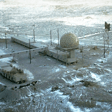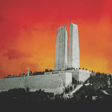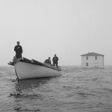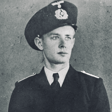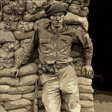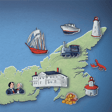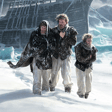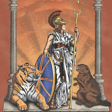
NATO vs Russia: 75-year standoff
The war in Ukraine has reinvigorated NATO as a bulwark against Russian aggression. But has NATO been a force for peace, or for military escalation? Historian Timothy Sayle digs into the alliance's 75-year history and explores its role in the world today.
Episode graphic: copyright NATO
Theme music: "Red River Jig" by Alex Kusturok
Music & soundclip credits: All soundclips courtesy NATO except the following:
00:00 - Peer Gynt Suite No. 1, Op. 46 - II. Aase's Death – Edvard Grieg - Czech National Symphony Orchestra – Public Domain / creative commons license / https://musopen.org/music/777-peer-gynt-suite-no-1-op-46/
00:48 - Chiselling – freesound.org / creative commons license / https://freesound.org/people/acostadelgado/sounds/200803/
00:50 - Outdoor crowd – freesound.org/ creative commons license / http://www.freesound.org/people/klankbeeld/
06:41 - Peer Gynt Suite No. 1, Op. 46 - II. Aase's Death – Edvard Grieg - Czech National Symphony Orchestra – Public Domain / creative commons license / https://musopen.org/music/777-peer-gynt-suite-no-1-op-46/
06:45 –– Dwight Eisenhower report to a joint session of Congress on the war in Europe and Africa, June 18, 1945 / US National archives (38.15) / unrestricted use https://catalog.archives.gov/id/2363636
08:48 – Soviet Anthem / Wikimedia commons / creative commons attribution – share alike license / https://commons.wikimedia.org/wiki/File:Soviet_Anthem1955_vocals.ogg
21:58 – Beethoven Moonlight Sonata, Op. 27 No. 2 / performed by Paul Pitman / public domain / creative commons license / https://musopen.org/music/2547-piano-sonata-no-14-in-c-sharp-minor-moonlight-sonata-op-27-no-2/
22:05 – President Ronald Reagan – speech at the Berlin Wall – 1987-06-12 / White House Television Office / public domain - https://ia801907.us.archive.org/5/items/ReagansSpeechAtTheBerlinWall/President%20Ronald%20Reagans%20Speech%20at%20the%20Berlin%20Wall%201987-06-12.mp4
29:34 – Tchaikovsky 1812 Overture – Skidmore College Orchestra – Creative Commons licence - https://musopen.org/music/5072-1812-overture-op-49/
30:28 - Soviet leader Mikhail Gorbachev, speaking at a joint press conference with U.S president George H.W. Bush, July 31 1991 / public domain / George Bush Presidential library / https://bush41library.tamu.edu/audiovisual/videos/77
